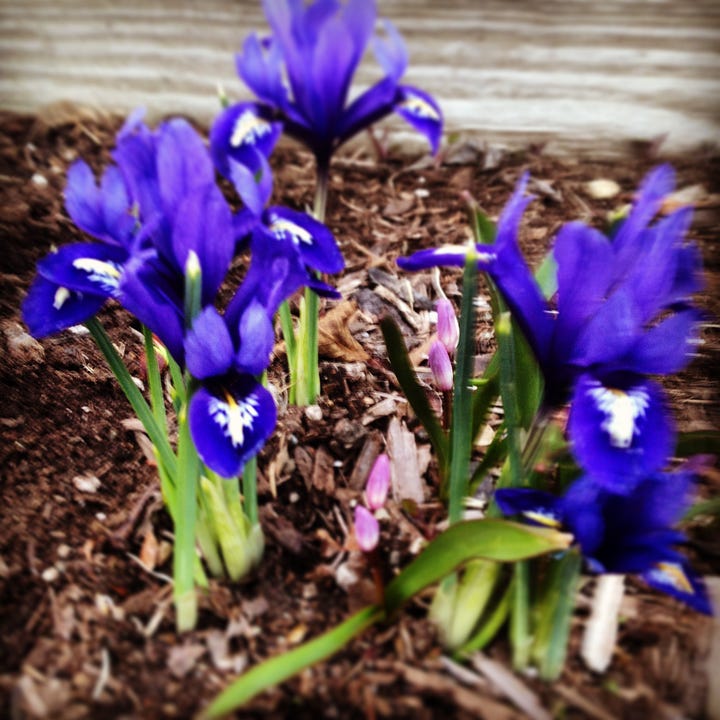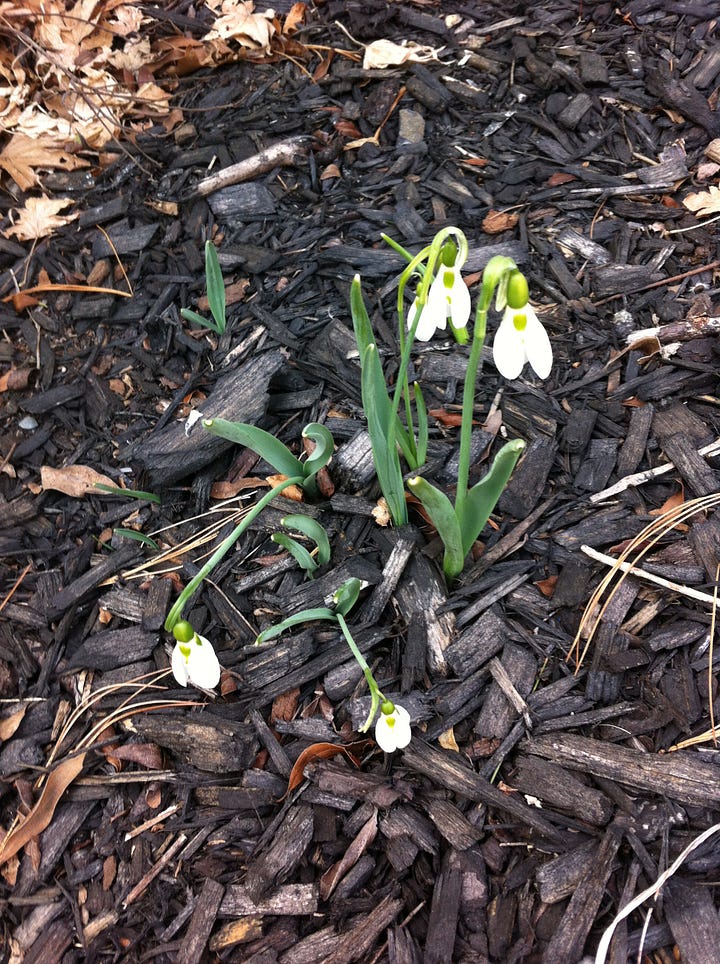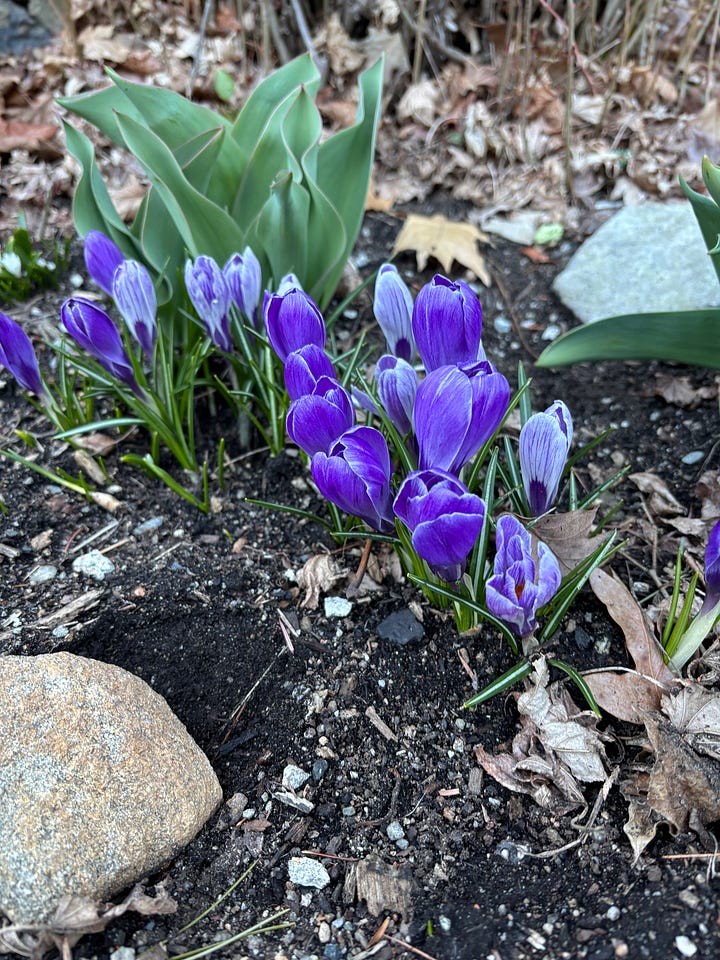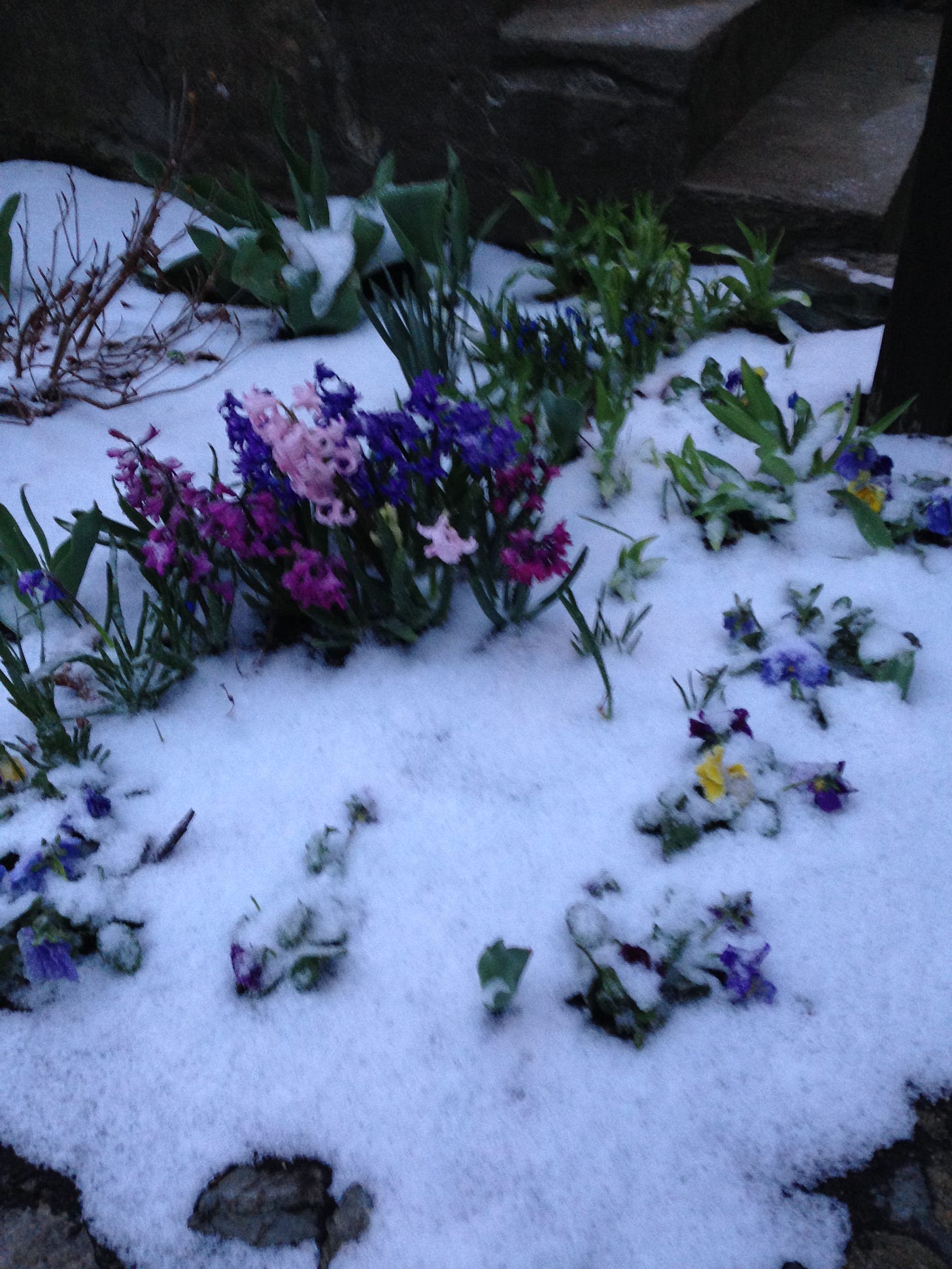



March is giving way to April. Winter is relenting her icy, frigid hold, allowing spring to usher in rebirth and blossom. The brave, defiant snowdrops have lead the way, with the small but mighty crocus and Dutch Iris offering their bold, deep purples against the washed-out leaf debris. Bright, colorful blooms are on their way—the majestic parade of daffodil, hyacinth, and tulip—resplendent in their yellow, orange, pink, and red flowers—is just a few weeks away.
Every spring, the first day the temperature pushes above 55 degrees, the sun is warm and my cheeks feel hot from solar energy, I remember that the long winter months, as much as I love them, also tamp down a certain exuberance, a certain ease of living. That spring offers a season that doesn’t require bundling, wrapping ourselves in wool, flannel, and goose down to protect against the harshness of biting Arctic wind.
The past two months have brought more than a wintry climate. The blitzkrieg of dictatorial orders attempting to dismantle the architecture and foundation of our government has felt like a Nor’Easter—strong winds whipping across felling trees and making even walking a challenge. Heavy bands of snow rendering it nearly impossible to travel or even see much beyond what is immediately in front of you. Waves strong and full enough to cause flooding on the coastline, sometimes carrying away entire houses with its forcible surge. In the midst of these powerful storms, it can be hard to remember the calm that came before, how life will possibly resume in a normal way. And yet, New Englanders have weathered many a Nor’Easter. Damage has been repaired, fallen trees cleared, snow shovelled and plowed. The feet of snow, burying the earth beneath, start to melt as the earth rotates closer and closer to the sun, washes away when the precipitation turns from frozen crystals to heavy, cold rain. And that icy surface revels the dirt, the courageous verdant first shoots of spring, pushing through the hard ground to remind us that below the hard pack of snow and ice, bulbs lay dormant, storing energy to push through and bring color back to our world.
I have, like many others, had a hard time figuring out my footing over the past two months. I make a decision to forge ahead, to continue on with the as if mentality I have been trying to adopt since January 21, and then something else happens. Another agency is slated for complete demolition. A doctoral student, described as a role model to [her] learning community, is detained just miles from my home. For co-writing an op-ed. Seven countries have now included the United States on their do-not-travel warnings to trans people. And the thin veneer that has been holding back the worry and fear and sometimes, hopelessness and horror, breaks. I wonder how to continue. How to face my colleagues. My clients. My children. When the world we are living in is increasingly run by leaders who want to prioritize the consolidation of wealth and power in the hands of a very few. Men who state that services that support not only the least-resourced members of our communities, but every person who has attended a public school, visited a National Park, gone to the Smithsonian museum while visiting DC, has a parent or loved one who receives Social Security or in on Medicaid or Medicare, has accessed special education services, has sent or received mail—that these services are bloated and wasteful. That the people who show up every day to provide healthcare to Veterans, preserve the history of our nation, study treatments for childhood cancer, collect the taxes that run our country, offer grants to the farmers that grow our food, oversee that food supply to ensure bacteria has not invaded it, disseminate vaccines to protect all of us from disease—that these folks are lazy, that they sit around all day collecting a paycheck for non-existent work. How quickly I can spiral into a familiar vortex of despair, despondence, discouragement.

Familiar because five years ago, right around this time, I spent a good amount of my waking hours swirling around faster and faster in that gaping void. I spent countless hours scouring the Internet for more and more information on COVID. I devised plans for how I would travel the almost 400 miles to visit my parents if either of them ended up hospitalized with the virus. I became frustrated and incredulous if someone suggested our children would return to school to finish out the end of the school year. I walked around in a constant state of distress. I’d spend hours on my phone—texting others, speculating about what was safest, how long this would all last. I started running to ensure that my lungs were as healthy as they could be so I would be in better shape to fight the virus if I caught it.
I was a mess. Living in a constant state of anxiety and fear. Clamoring for any information I could find to try and understand something that no one really understood yet. I fed that fear constantly. I found others who were in similar spirals, similar places of swirling around and around, trying to satiate the lack of knowing with conjecture and catastrophizing. It was addictive, this search for knowledge that didn’t exist. And it took me further and further away from the place I needed to be: acceptance of not knowing. Focused on the present. Enjoying the sparkling joys and triumphs that persisted despite the devastation of a virus scientists did not yet understand.
Eventually, I emerged from all of that. Figured out how to do exactly those things. To spend hours in the woods, forest bathing, calming my senses by immersing myself in nature and leaving the worries of the day and the world behind. Discerning how to pare my life down to what truly mattered to me. Letting go of people and activities that fed that vortex of worry and fear and anxiety. Centering myself in true connection, purpose, meaning. Working hard at strengthening and nurturing ways of engaging with others and the world around me that felt authentic and meaningful. Reconnecting with people from different parts of my life who had been important.
And in the past two years, it felt like I had bound forward. I could recognize the gifts of COVID—a renewed appreciation for the importance of connection and meaning, a letting go of things that didn’t feed my soul, an understanding that my boys’ childhoods were sprinting toward the finish line—young adulthood lying ahead, a new connection with nature and slowing down, a putting down of striving and anxiety as drivers in my professional and personal life. In so many ways, I felt like I was in the spring time of the latter half of my life—a reawakening, a rebirth, a renewal of my values and self. So many opportunities to revisit and revitalize old connections, to see how friends had changed and grown in their own lives over the past several decades. To delight in their happinesses and growth, to bear witness to their struggle and setbacks. And then, the chance to return to my early vocation—working again with Veterans struggling in their relationships.
When the assault on our government and our people began just more than two months ago, it felt unfair, to say the least. How could we return to this state of survival? How could we be subjected again to the whims of a childish despot? Hadn’t we just emerged from the ravages of COVID? Hadn’t we just started to regain our social muscles, our ability to comfortably be in community again? I felt angry at the universe, angry that we would have such unrelenting hardship follow on the heels of a pandemic. It was as if the spring bulbs had burst into bloom, only to be covered by a thick blanket of icy snow.
At the end of this week, I saw a client for her weekly session. We have worked together for close to a decade. I first met her years ago when her therapist was out of the office, and she called, needing some support. She was struggling, in a dark place, and I was able to offer her empathy, a place to share that darkness and put it down and walk back into the sunlight. She has worked so hard to stay in the sun, to welcome its warmth and appreciate how different the world looks in the light of day, to know that each dark, cold night is followed by morning. That the sun will always rise. Spring will always follow winter. She is a giver—someone who offers hope and inspiration to see things through to the other side of struggle to so many people in her circles. And she has struggled mightily to allow herself to keep any of that brightness for herself.
This week, she shared feeling the heaviness, the weight of the world and all its atrocities bearing down on her shoulders, her back, her heart. She admitted to feeling on the edge of that panicky feeling that things will not right themselves, that this will be the year of the long winter that doesn’t give way to spring, but instead, holds on and persists, leading us into a new ice age. She shared her feelings of hopelessness, of despair that this beautiful world will not come back into view, clouded over by the twin atrocities of greed and indifference. She wondered aloud how we could be expected to bear this much again, when COVID had only just started to recede into the rear view.
I thought of my own struggle to stay grounded, to keep my feet planted in the present, to keep my eyes on the sunlight creating perfect dazzling points of light on the newly thawed pond, my ears attuned to the swelling chorus of peepers—the small tree frogs whose song is full of love, trying to outsing their neighbor in their early spring quest to attract a soulmate. I thought about grit, resilience, and posttraumatic growth and the way humans, for as long as they have existed, have taken pain and turned it into music, poetry, theater, and beautiful art. I thought of all the things I had gained from COVID—the hours spent hiking in the woods with my family at a time when the boys naturally would have started spending less and less time with us. The trip to Cape Cod with my parents in September 2020, when just the sight of them made me cry with relief and joy to hug them close, to take walks on the beach, to hear them talking with my boys, their grandsons. The deepening of appreciation when I worried that a virus could have taken them from us all. A new friendship forged through a weekly donut delivery for a family going through the painful ordeal of cancer treatment during COVID. The unwinding and settling down of my anxious, striving mind. A renewed commitment to my values. A recognition that I wanted to start with yes when it came to my boys’ requests of me. A rekindling of my love affair with nature. The way that absence of connection made reuniting that much more sweet and precious.
What if, I wondered with my client, COVID was a preparation for this test of democracy? What if we see it as reminding us of what is important? Of the value of our connections, our relationships, our purpose, our values, our interconnectedness? Our understanding that we belong to each other? What if we approached this fight against the last gasp of tyranny, this last protest against a world that celebrates difference and prioritizes equality, not from a place of feeling depleted by the hardship of the pandemic, but instead by recognizing how it readied us for this exact moment?
What if we remembered that the slowing down of the world five years ago taught us to appreciate more fully the importance of wonder, the value of marvel, the deep fulfillment of delight, the beauty that can arise from vulnerability, the quiet and humble reverence of joy?
What if this is the source of our power?
To not be devastated by these attempts at destruction.
To not lose the ability to recognize the promise in the morning doves call. The ability to be momentarily lost in the scent of a lilac, a hyacinth, a rose. To marvel at the bud, pushing through the bark of a branch, breaking out into the delicate, dusty rose of a dogwood blossom.
The power in a shared connection. The healing that is possible just by listening, fully, and saying, I can feel your pain as my own. I know you have hurt. I know you have felt broken. And I am here, beside you, walking with you, reminding you that you are not your pain. You are not your despair.
You are the brilliance of the sunrise. The pure singular note of the tufted titmouse. on a warm spring day. The refreshing, bright scent of the verbena in mid May. The sparkling eyes of a mother looking back at her perfect, innocent baby, reflecting to that child that she is the most loved, most treasured being that has ever been born.
It can feel foolish to pause to marvel at the stars when the world is burning. Or to find the world beautiful when you’ve known it to betray you.
But wonder is a liberation practice. A reminder that we contain more than tragedy. Beauty is our origin and our anchor.
Cole Arthur Riley
Black Liturgies
What if, beauty—in all its forms—is both our origin and our anchor?
And so, my friends, I am going to continue on. I am going to continue to see the beauty in my friend’s faces—the wisdom they hold from their many decades on this earth, the innocence and blissfulness captured in the sparkling eyes of a young child, the promise of a full life stretching out ahead of my three boys, the healing contained in stopping to listen and hold the pain that life has doled out so inconsistently, the breathtaking sight of the Lenten rose with her demure nod as she offers up her delicate pale rose petals, the well-worn, comfort of the arms of a man I’ve loved for almost two-thirds of my life.
I know that love has always won out in my life. Choosing kindness, recognizing connection, stopping to appreciate the sublime in everyday things has never been a mistake, never been something I’ve regretted.
If my job ends tomorrow, I won’t regret the effort and heart and passion I put into today.
So I am bounding forward into spring. I am embracing wonder as a liberation practice. And I am remembering the lessons I learned in COVID and trusting they are lighting the way through this dark time. That this dark night will be followed by the rising of the sun and the dawn of a new day.
You do not have to be known
Even the best of us have sometimes felt alone
This whole world is your home
Reach out your branches, let your roots back to the soil
And watch the rain help you growI'm walking slowly
I'm taking my time
All our lack of talking is starting to rhyme
I'm letting go of lonely, letting go of strife
I just can't get enough of this beautiful life-Richard David Wimbish
All photos were taken by the exceptional Dana Giuliana, unless otherwise noted.
Thanks for spending some of your day reading this post. I hope it resonated. Periplum of motherhood and other wonderings is free. If you enjoy reading, please share it with friends!






This is lovely.
🙏❤️